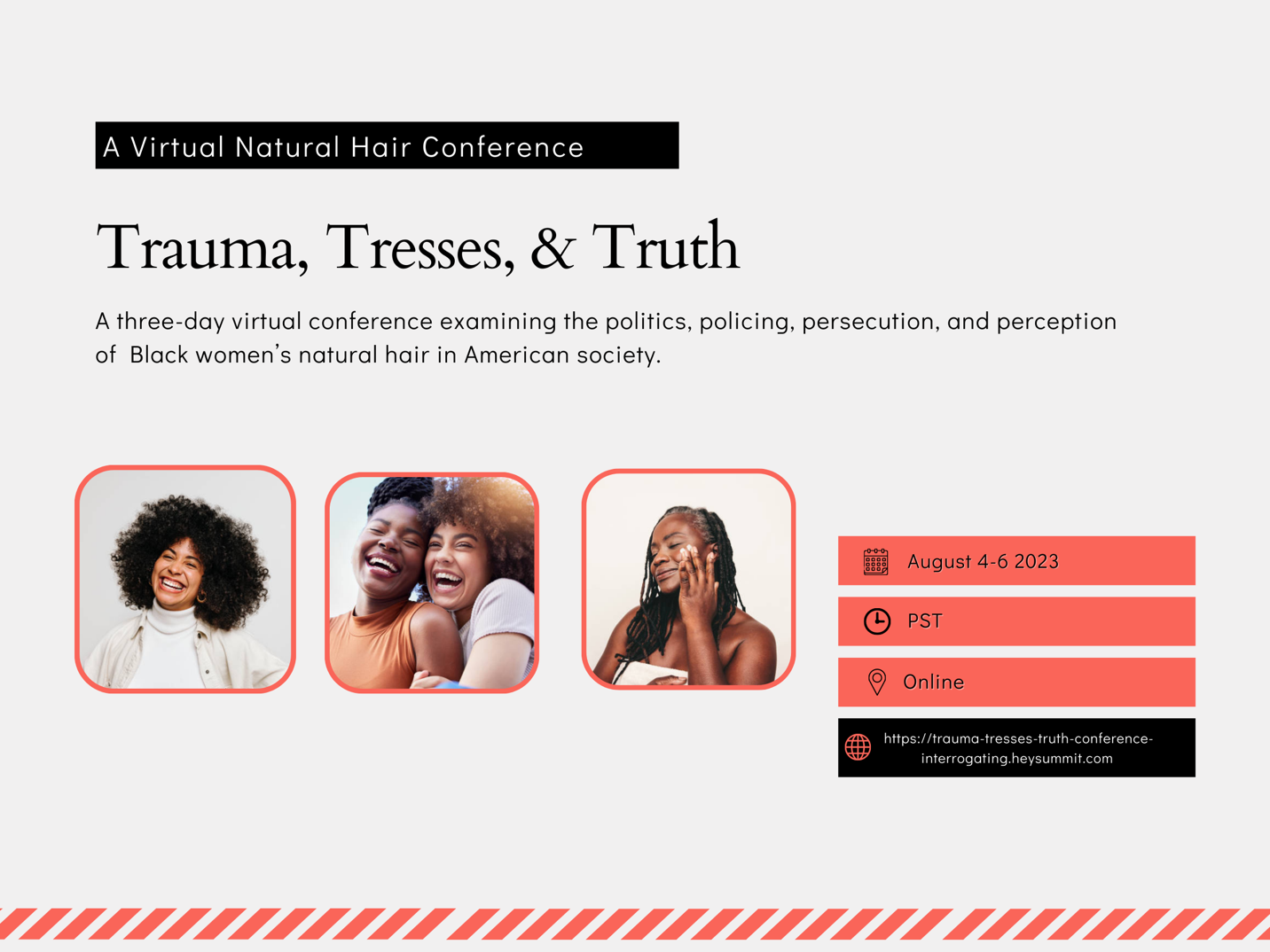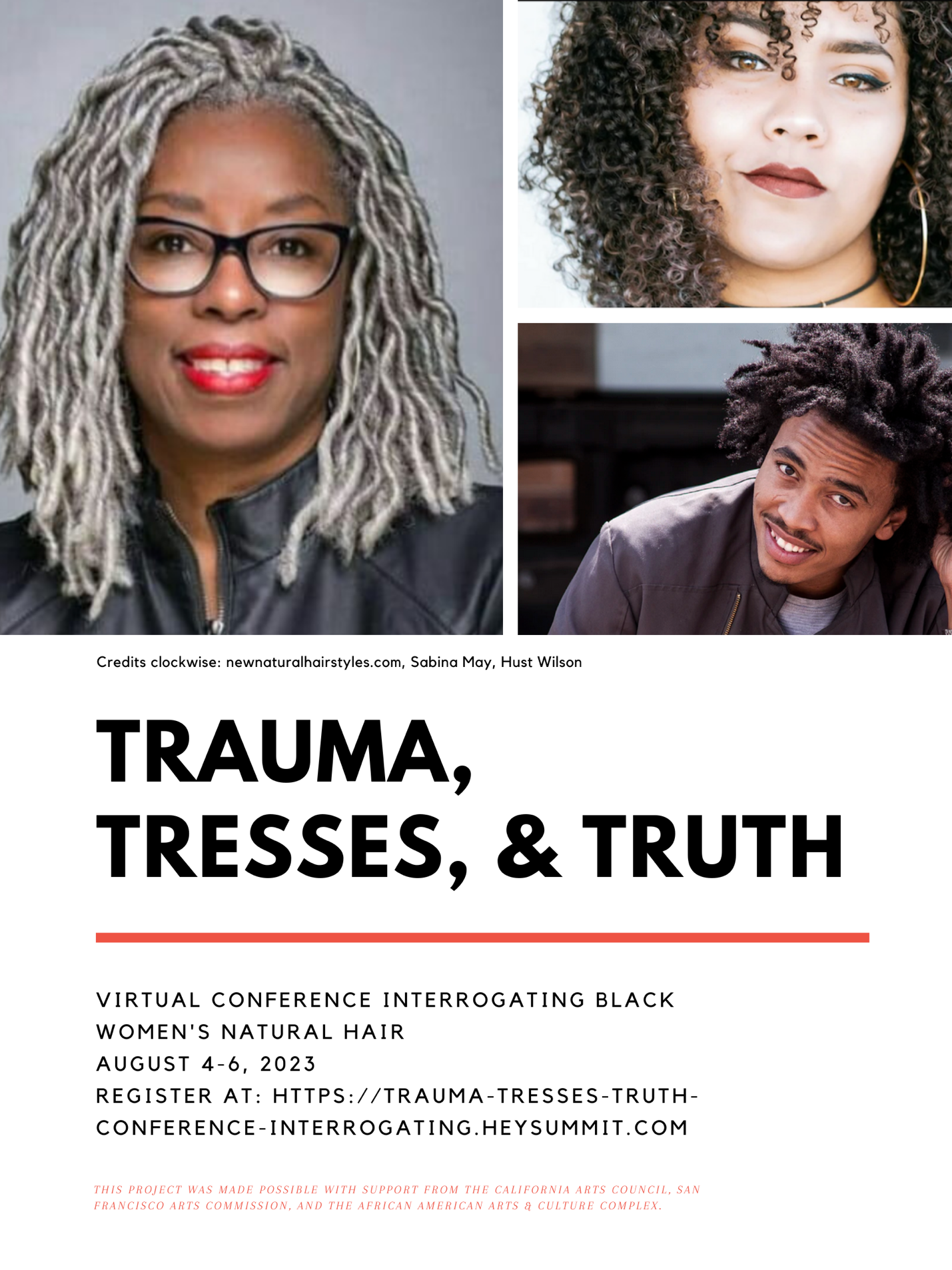This past July 3rd was the third official National CROWN Day, a celebration of the nation’s first passing of The Crown Act (aka CROWN Act) in California. CROWN is a backronym standing for Create a Respectful and Open Workplace (or World) for Natural Hair. Governor Gavin Newsom signed the bill into law on July 3, 2020, a date that, since 2021, has been celebrated as National CROWN Day. This legislation, SB 188, made California the first state to prohibit race-based hair discrimination in workplace and educational environments. California is also the site of the nation’s first CROWN Act lawsuit.
My virtual conference the TRAUMA, TRESSES, & TRUTH: 2nd Conference Interrogating Black Women’s Natural Hair, will run August 4th, 5th, and 6th, 2023. This conference is based on my book TRAUMA, TRESSES, & TRUTH: Untangling Our Hair Through Personal Narratives (Chicago Review Press 2022). This online conference consists of panels, workshops, creative writing readings, and webinars, all examining the perception, policing, persecution, and politics of Afro Latina and African American women’s natural hair in American society. Admissions passes are available at here.

I wish there’d been a day like National CROWN Day or a conference like mine when several decades ago, I began my first leadership role as account manager in a small Wall Street firm. On my first day in the office, I was in the midst of meeting my coworkers. One man in his late thirties, sporting a shock of russet curls, a bright white shirt, and a polished silver watch, came into my office to introduce himself with a nutcracking handshake. We made small talk, then business-speak, back to small talk. Only so much to be said about the weather, the traffic, and the mayor. A column of silence rose between us. “How did you get your hair like that?” he asked. He reached across my desk and ran all five fingers of his right hand through my braids.
I seized his arm mid-arc, gripped it just hard enough to signal my spirit, and knocked it away with a fisted hand. I glared at him, letting a new, foul silence shroud us for several seconds. “If you want to touch my hair,” I said, “you ask first. And when you do ask, I’ll say no.”
Shock and puzzlement leaped through his features. I read the flash of apprehension in his eyes. He exited.
Countless Black folks have heard from employers that their natural hair is unprofessional, distracting, or excessive. But — very telling — we tend not to hear these comments when we alter our hair with a relaxer, or straighten it with a hot comb or flat iron. Why is our hair acceptable then? Because it looks less ethnic. Few Black women have managed to clear childhood without hearing insulting remarks concerning their hair.
Eighteen states and a few municipalities have enacted a CROWN Act. That’s progress, though still a glass half-empty. In the holdout states, employers and educational institutions are free to discriminate against me based on my hair. An employer extending a job offer to me can make that offer contingent upon my removing, cutting, or otherwise altering my dreadlocks. We need a federal CROWN Act so that African Americans in every state are protected against hair bias in their workplaces, schools, and other professional environments. Our hair is not unprofessional just because it is different. There’s nothing wrong with the way our hair naturally grows from our heads.
San Diego’s Jeffrey A. Thornton has filed a lawsuit against Encore Global (USA), a company that extended him a job offer as a Technical Supervisor with one proviso: that he cut his dreadlocks. A hiring manager told Thornton that, in order to work in the San Diego office, he would have to cut his locs. What’s confounding is that Thornton, an audiovisual technician, worked four years for this same company’s Florida office, with no issues. Thornton has retained counsel and seeks a jury trial, company policy change, and formal apology. The General Allegations text reads, “Plaintiff specifically invokes the Crown Act which prohibits employers from withholding employment based on discrimination against the protected applicant’s hairstyle.” In California, Mr. Thornton has grounds for a case under state law.
A 2016 Perception Institute survey of women found that although the majority of both Black and White respondents exhibited bias against natural hair, White women “showed explicit bias” against women who wear natural hairstyles, while one in five Black women “feel social pressure to straighten their hair for work—twice as many as White women.”
Black women continue to have a convoluted relationship with their hair. Why, in 2023, is this still the case? Who gets to author the prevailing constitution of professional appearance? How do we encourage course correction and alter the prism through which our hair is interrogated? Which differences make a difference? And when?
Hegemonic institutional policies have been weaponized against my hair. In 2023 our country will celebrate the third National CROWN Day, and we’ve just celebrated the second official Juneteenth holiday. How will Mr. Thornton’s lawsuit resolve? In California, his case looks solid. Perhaps by the time he goes to court, this nation will have passed federal CROWN Act legislation to protect Black people’s hair in every state.

Lyzette Wanzer, MFA is a San Francisco-based author, creative writing instructor, and editor and contributor to TRAUMA, TRESSES, & TRUTH: Untangling Our Hair Through Personal Narratives (Chicago Review Press 2022). Library Journal named the book a 2022 Top 10 Social Sciences title. Lyzette is Founder and Producer of the upcoming 2nd Virtual Conference Interrogating Black Women’s Natural Hair. You may reach her through https://www.lyzettewanzermfa.com.


